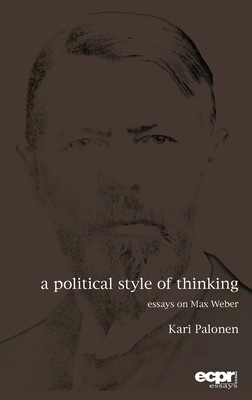
- We will send in 10–14 business days.
- Author: Kari Palonen
- Publisher: ECPR Press
- ISBN-10: 1785522655
- ISBN-13: 9781785522659
- Format: 15.6 x 23.4 x 1.4 cm, kieti viršeliai
- Language: English
- SAVE -10% with code: EXTRA
Reviews
Description
Max Weber studies have been radically transformed since the 1980s. The author continues this revision by reading Weber as a thoroughly political thinker. Weber's key concept is Chance, a concept that allows us to study politics as contingent activity and to understand both the actions of politicians and the presence of the political aspect in research. This collection contains essays from 1999 to 2014 and a new introduction. The first part deals with Weber's concept of politics and the politician as an ideal type, the second discusses Weber's reinterpretations of key political concepts of freedom, democracy, parliament, nation and the state. The third part links Weber's concept of 'objectivity' with the parliamentary style of politics. The essays set Weber's political thought in relationship to his predecessors (Constant, Bagehot, Nietzsche), contemporaries (Sombart, Schmitt, Benjamin), later (Arendt, Sartre) or contemporary scholars (Skinner, Koselleck) and current Weber studies (Hennis, Scaff, Ghosh).
EXTRA 10 % discount with code: EXTRA
The promotion ends in 23d.16:01:24
The discount code is valid when purchasing from 10 €. Discounts do not stack.
- Author: Kari Palonen
- Publisher: ECPR Press
- ISBN-10: 1785522655
- ISBN-13: 9781785522659
- Format: 15.6 x 23.4 x 1.4 cm, kieti viršeliai
- Language: English English
Max Weber studies have been radically transformed since the 1980s. The author continues this revision by reading Weber as a thoroughly political thinker. Weber's key concept is Chance, a concept that allows us to study politics as contingent activity and to understand both the actions of politicians and the presence of the political aspect in research. This collection contains essays from 1999 to 2014 and a new introduction. The first part deals with Weber's concept of politics and the politician as an ideal type, the second discusses Weber's reinterpretations of key political concepts of freedom, democracy, parliament, nation and the state. The third part links Weber's concept of 'objectivity' with the parliamentary style of politics. The essays set Weber's political thought in relationship to his predecessors (Constant, Bagehot, Nietzsche), contemporaries (Sombart, Schmitt, Benjamin), later (Arendt, Sartre) or contemporary scholars (Skinner, Koselleck) and current Weber studies (Hennis, Scaff, Ghosh).


Reviews